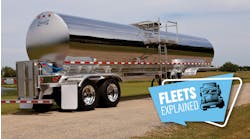OOIDA’s statements came as it submitted its official response to the Federal Motor Carrier Safety Administration (FMCSA) on a proposal from the Truckload Carriers Association (TCA) to initiate a pilot program allowing people younger than 21 to get a CDL. The FMCSA is currently reviewing the scheme.
In its comments on the proposal, OOIDA said that the suggestion to bring in 18-year-old drivers is an attempt by carriers to survive in a highly competitive industry by recruiting cheaper labor. OOIDA disputes claims of a serious shortage of drivers. “If the drivers were adequately compensated and work condition significantly improved, then motor carriers would be able to recruit and retain more than sufficient numbers of drivers 21 years old and older,” said OOIDA president Jim Johnston.
“With few exceptions, trucking rates and, therefore driver compensation, have remained stagnant over the last 20 years. This is not a new problem,” Johnston said. “At the same time, the amount of uncompensated time that drivers are required to donate to the job, like wasted time at the shipping and receiving facilities, has reached unconscionable levels.”
OOIDA’s response cited the long hours and rigorous working conditions of the trucking industry. According to the Dept. of Labor, truck drivers are 6.5 times more likely to be killed on the job than the average worker. Severe traffic congestion, bad weather conditions, unsafe truckstops and warehouse locations all put truck drivers at great personal risk and can have perilous consequences for drivers who lack maturity or experience behind the wheel.
OOIDA said a number of critical factors must be considered by FMCSA in approving or rejecting the proposal and points to the less-than-lackluster safety record of younger drivers.
“We don’t believe that highway safety or driver recruitment will be improved by lowering the age limit and we’re convinced that teenagers driving heavy trucks would result in a lower standard of safety on our nation’s highways,” Johnston said.


